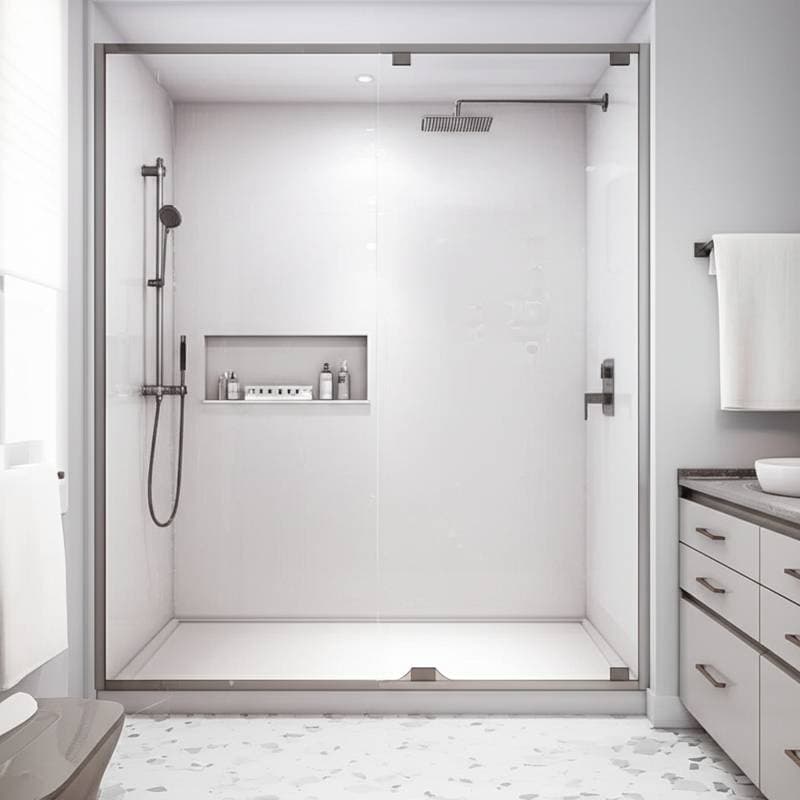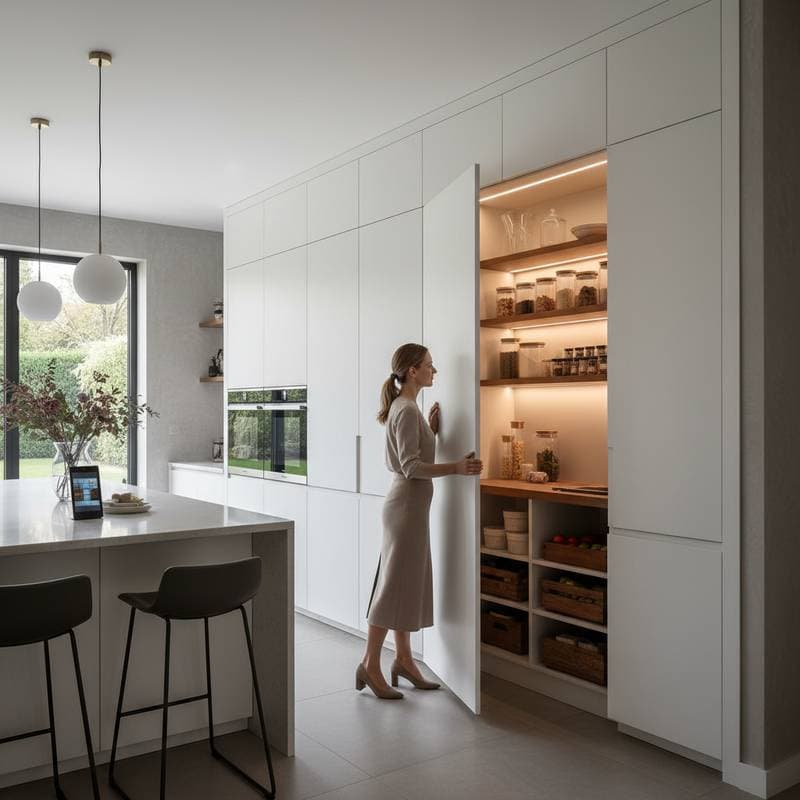Doorless Showers Enhance Home Value by 11 Percent in Wet Room Configurations
A thoughtfully designed wet room featuring a doorless shower can increase a home's resale value by up to 11 percent. Prospective buyers appreciate the combination of luxury aesthetics, streamlined design, and straightforward maintenance. Homeowners benefit from reduced cleaning efforts on glass surfaces and an expanded sense of spatial freedom.
Factors Contributing to Increased Value
Homebuyers prioritize bathrooms that combine elegance with practicality. A doorless shower eliminates visual obstructions, fostering a sense of openness. This design also accommodates individuals with mobility challenges, including aging residents or visitors, by facilitating safer navigation. Such versatility broadens the appeal across demographic groups, thereby expanding the potential buyer pool.
For affluent purchasers, wet rooms evoke the tranquility of upscale spa environments. The seamless integration of elements creates an impression of bespoke craftsmanship tailored for rejuvenation. Real estate professionals observe that properties equipped with these features capture superior photographic angles and staging opportunities, often resulting in expedited sales and competitive bidding.
Detailed Cost Analysis
| Task | Typical Cost Range | Influencing Factors |
|---|---|---|
| Design and Planning | $500 - $1,500 | Project complexity, designer expertise |
| Waterproofing System | $800 - $2,000 | Area dimensions, material brand, substrate preparation |
| Tile and Materials | $1,500 - $5,000 | Tile variety, dimensions, installation pattern |
| Drain and Plumbing | $600 - $2,500 | Necessity of rerouting pipes, drain configuration |
| Installation Labor | $3,000 - $7,500 | Local labor rates, extent of demolition |
| Fixtures | $800 - $3,000 | Material finish, manufacturer quality, integrated features |
The aggregate cost for a complete wet room transformation typically ranges from $6,000 to $18,000, with variations based on geographic location and specific selections.
Guidelines for DIY Versus Professional Involvement
Consider undertaking the project independently under these conditions:
- Possession of prior experience in tiling and basic plumbing.
- Retention of the existing shower footprint without alterations.
- Availability of a waterproofing system accompanied by comprehensive installation guidelines.
Engage a professional contractor in the following scenarios:
- Requirement to relocate plumbing lines or install a new drain.
- Necessity to adjust the floor pitch for proper drainage.
- Desire for formal warranties or compliance with municipal inspections.
Experienced installers utilize specialized equipment, such as tools for applying waterproof membranes and ensuring precise leveling. They adhere to regional building codes, mitigating risks of water intrusion and structural compromise. Manufacturers of tiling products frequently invalidate guarantees if membranes or slopes deviate from specifications, underscoring the potential long-term expenses of inadequate execution.
Essential Safety and Regulatory Considerations
Effective waterproofing demands meticulous attention to detail, as even minor imperfections may result in mold proliferation or subfloor deterioration. Conduct thorough leak testing prior to tile application by directing water flow onto the surface and monitoring for accumulation or infiltration.
Certain localities mandate permits for drain modifications, while others require verification of waterproofing integrity before proceeding with finishes. Consult applicable regulations in your area to ensure compliance from the outset.
In colder climates, incorporate insulation along exterior walls to counteract condensation risks. For regions with high humidity, select grout formulations resistant to mildew and install robust exhaust fans to maintain air circulation.
Versatile Style and Design Possibilities
Doorless showers adapt seamlessly to diverse aesthetic preferences, aligning with the overall character of the residence.
Contemporary Minimalist Approach
Opt for expansive white or neutral gray tiles, concealed drainage systems, and wall-hung hardware. Employ subtle, ambient lighting to enhance the illusion of spaciousness. This configuration proves particularly effective in compact bathrooms, amplifying perceived volume.
Serene Spa-Inspired Sanctuary
Incorporate natural stone accents, porcelain mimicking wood grains, and inviting warm illumination. Integrate a built-in seating area and recessed storage for amenities like essential oils. Textural elements promote a soothing atmosphere conducive to unwinding.
Robust Urban Industrial Aesthetic
Pair concrete-emulating tiles with matte black hardware and selective transparent dividers. Maintain crisp lines and opt for darker grout joints to simplify upkeep.
Tranquil Coastal Theme
Select pale blue tones, textured sea glass tiles, and polished nickel accents to evoke seaside serenity. Enhance with overhead natural light sources, such as skylights or obscured glazing, for a refreshing ambiance.
Adapting Doorless Designs to Compact Bathrooms
Contrary to common assumptions, doorless showers thrive in constrained spaces. The absence of enclosing doors extends sightlines, creating an impression of greater depth and breadth. Install a solitary glass panel for targeted splash containment without compromising openness.
For areas narrower than five feet, incorporate a low-profile barrier to direct water flow. Pair this with an elongated linear drain and calibrated floor gradient to preserve dryness in adjacent zones.
Streamlined Maintenance Practices
The reduction in mechanical components minimizes cleaning demands, as doorless configurations avoid the accumulation of residue in tracks, pivots, or gaskets. Perform a prompt wipe-down with a towel post-use to expedite drying.
Reapply grout sealant biannually to fortify moisture resistance. Inspect and clear the drain periodically to prevent clogs. Activate ventilation during and following showers to inhibit fungal growth. A handheld squeegee facilitates effortless wall drying on a daily basis.
Strategic Timing for Upgrading from Conventional Showers
Initiate a wet room conversion when existing shower enclosures exhibit fogged panels, compromised seals, or fractured surfaces. The expense of piecemeal repairs frequently approaches that of a comprehensive overhaul, rendering the upgrade economically viable. The resultant appreciation in property value often recoups a significant portion of the investment.
Market analytics indicate that listings highlighting 'luxury bath' or 'wet room' descriptors generate elevated digital engagement. Beyond financial returns, the enhanced usability and expansive layout elevate daily living experiences for long-term occupants.
Pitfalls to Sidestep During Implementation
- Neglecting verification of drainage gradients, which may cause water stagnation along perimeters.
- Selecting polished surface tiles, prone to slippage under wet conditions.
- Overlooking sealing of angular joints, inviting potential leaks.
- Inadequate airflow provisions, fostering humidity-related issues like mold and surface degradation.
- Excessive fixture placement, impeding fluid movement within the area.
Expert Recommendations for Optimal Results
- Simulate water flow prior to finalizing tile installations to identify gradient or dispersion anomalies promptly.
- Employ oversized tiles on vertical surfaces and finer formats on horizontals for enhanced grip and visual harmony.
- Integrate alcove shelving within sealed perimeters to organize essentials efficiently.
- Position illumination to accentuate material textures while minimizing reflections from moisture.
- Site accessory hooks accessibly yet beyond primary water exposure.
These refinements substantially influence the practical performance and sensory appeal of the wet room over time.
Frequently Asked Questions
What is the potential value increase from a doorless shower?
Up to 11 percent enhancement in resale price, contingent upon execution quality and local market dynamics.
Will a doorless shower lead to widespread water splatter?
Not with accurate sloping and drainage; proper showerhead orientation is crucial for containment.
Implementing Your Wet Room Vision
Transitioning to a doorless shower represents a forward-thinking investment in both property equity and personal enjoyment. By prioritizing waterproof integrity, stylistic coherence, and user-centric details, homeowners unlock a bathroom that endures across seasons and lifestyles. Consult local specialists to tailor the project to your home's unique architecture, ensuring lasting satisfaction and market distinction.











